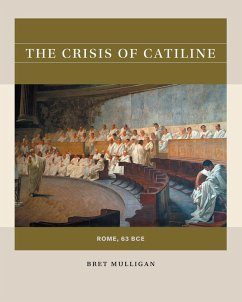
The Catiline Conspiracy (eBook, ePUB)

PAYBACK Punkte
0 °P sammeln!
In "The Catiline Conspiracy," Sallust presents a meticulously crafted account of the political turmoil in late Republican Rome ignited by the machinations of Lucius Sergius Catilina. Written in a terse and evocative prose style, the work encapsulates themes of moral decay, ambition, and the battle between corrupt aristocrats and virtuous patriots. Sallust's historical narrative intertwines rhetorical sophistication with a strong moral stance, reflecting the turbulent landscape of Roman politics in the 1st century BCE. Through vivid character portrayals and incisive commentary, he exposes the f...
In "The Catiline Conspiracy," Sallust presents a meticulously crafted account of the political turmoil in late Republican Rome ignited by the machinations of Lucius Sergius Catilina. Written in a terse and evocative prose style, the work encapsulates themes of moral decay, ambition, and the battle between corrupt aristocrats and virtuous patriots. Sallust's historical narrative intertwines rhetorical sophistication with a strong moral stance, reflecting the turbulent landscape of Roman politics in the 1st century BCE. Through vivid character portrayals and incisive commentary, he exposes the failings of both individuals and the state, providing a profound critique of an era marked by ethical decline and civic strife. Sallust, a politician turned historian, drew on his experiences in the tumultuous environment of Roman politics to write this influential work. His disillusionment with the political elite and shifting allegiances profoundly shaped his perspective, imbuing his narrative with a sense of urgency and moral gravity. As one of the earliest historians to prioritize the moral dimension of history, Sallust's insights into human behavior and societal collapse remain timeless, echoing the moral dilemmas that resonate throughout history. "The Catiline Conspiracy" is essential reading for anyone seeking to understand the intricate relationship between power and morality. Sallust's keen observations and engaging style invite readers to reflect on the dangers of unchecked ambition and the complexities of governance. This seminal text not only enriches our understanding of Roman history but also offers timeless lessons relevant to contemporary political discourses.
Dieser Download kann aus rechtlichen Gründen nur mit Rechnungsadresse in A, B, BG, CY, CZ, D, DK, EW, E, FIN, F, GR, H, IRL, I, LT, L, LR, M, NL, PL, P, R, S, SLO, SK ausgeliefert werden.













